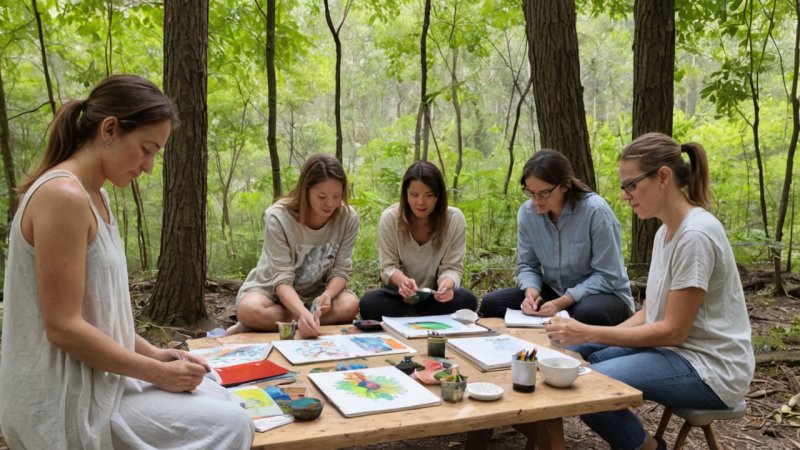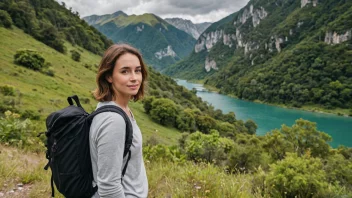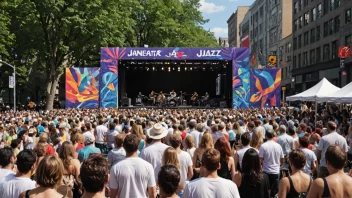In a world where stress and mental health issues are becoming increasingly prevalent, the search for innovative and effective healing methods is more important than ever. Art therapy retreats offer a unique approach to wellness, combining the therapeutic benefits of creativity with the restorative power of nature. These retreats invite participants to explore their inner selves through various art forms, facilitating healing, self-discovery, and connection with others. This article delves into the essence of art therapy retreats, providing insights on what to expect, the benefits of artistic expression, and tips for choosing the right retreat.
What is Art Therapy?
Art therapy is a form of psychotherapy that utilizes creative processes to help individuals express themselves, explore emotions, and confront psychological challenges. It operates on the premise that creative expression can foster emotional healing and personal growth. Whether through painting, sculpture, music, or dance, art therapy can serve as a powerful tool for individuals looking to process their feelings or navigate difficult life experiences.
The Role of Retreats in Healing
Retreats provide a conducive environment for self-reflection and healing, often set in serene locations away from daily distractions. Participants can immerse themselves in nature, allowing them to disconnect from hectic lifestyles and reconnect with themselves. Art therapy retreats combine this serene atmosphere with guided creative activities, making them a transformative experience for many attendees.
Benefits of Art Therapy Retreats
Engaging in art therapy during a retreat offers numerous benefits, including:
- Enhanced Emotional Expression: Art allows individuals to express feelings that may be difficult to articulate verbally, facilitating deeper emotional exploration.
- Stress Reduction: The creative process can be calming and meditative, helping to lower anxiety and promote relaxation.
- Community and Connection: Retreats foster a sense of belonging and connection with others, creating a supportive environment for sharing experiences.
- Self-Discovery: Participants often gain insights about themselves through their artwork, leading to personal growth and increased self-awareness.
- Skill Development: Many retreats include workshops led by professional artists or therapists, allowing participants to develop new creative skills.
What to Expect at an Art Therapy Retreat
Art therapy retreats vary in structure and offerings, but participants can generally expect the following:
Creative Activities
Workshops and sessions may include painting, drawing, collage-making, pottery, and other artistic endeavors. These activities are often led by trained art therapists who guide participants through the creative process and facilitate discussions about their art.
Mindfulness Practices
Many retreats incorporate mindfulness techniques, such as meditation and yoga, to enhance relaxation and presence during the creative process. These practices help participants become more attuned to their feelings and thoughts.
Nature Immersion
Set in picturesque locations, art therapy retreats often include outdoor activities that promote connection with nature. This integration of the natural world can enhance feelings of peace and inspiration.
Group Sharing Sessions
Participants are encouraged to share their artwork and experiences with the group, fostering a sense of community and support. These sharing sessions can provide valuable insights and validation.
Choosing the Right Art Therapy Retreat
When selecting an art therapy retreat, consider the following factors:
Location
Look for a retreat center that resonates with you. Natural settings, such as mountains or beaches, can enhance the overall experience.
Facilitators
Check the credentials and experience of the facilitators. Look for qualified art therapists or experienced artists who can provide guidance and support.
Program Structure
Review the schedule and offerings to ensure that the retreat aligns with your interests and goals. Some retreats may focus more on specific art forms, while others may offer a broader range of activities.
Group Size
Smaller groups often allow for more individualized attention, while larger groups may foster a greater sense of community. Consider what environment you feel more comfortable in.
Unique Experiences in Art Therapy Retreats Around the World
Various art therapy retreats around the globe offer unique experiences that cater to different interests and needs. Here are a few noteworthy examples:
1. The Art of Living Retreat Center, North Carolina, USA
This retreat center provides a holistic approach to wellness, incorporating art therapy with yoga, meditation, and Ayurvedic practices. Participants can engage in creative workshops while surrounded by the beauty of the Blue Ridge Mountains.
2. The Art Retreat, Bali, Indonesia
Set in the lush landscapes of Bali, this retreat combines art therapy with cultural exploration. Participants can learn about traditional Balinese art forms while engaging in their creative practices. The serene environment enhances the therapeutic experience.
3. Omega Institute, New York, USA
Known for its diverse wellness programs, the Omega Institute offers art therapy retreats that focus on self-discovery and healing through creative expression. The institute's beautiful campus provides a peaceful backdrop for reflection and creativity.
4. La Maison de l’Art, France
This French retreat offers a unique blend of art therapy and culinary experiences. Participants can explore their creativity through various art forms while also enjoying cooking workshops that emphasize the connection between food and art.
Conclusion
Art therapy retreats provide a powerful avenue for healing and self-discovery through creativity. By engaging in artistic expression in a supportive environment, participants can unlock their emotions, reduce stress, and foster personal growth. Whether you are seeking respite from daily pressures or looking to explore your creative side, an art therapy retreat can offer transformative experiences that resonate long after the retreat has ended. As you embark on your journey towards wellness, consider the unique opportunities that these retreats present, and open yourself to the healing power of art.






